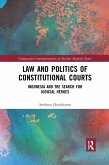From Old Times to New Europe considers the post-totalitarian legal framework in today's Europe, arguing that the study of totalitarianism and post-totalitarianism continues to be significant as ever. Drawing mainly on the Polish experience, this analysis focuses on the significant part played by history in the development of the region's identity and preferences concerning the role of the state in public and private life. It examines the political, socio-economic and legal aspects of key events and draws comparisons with other CEE states, whilst implementing key socio-legal theories to explain trends and strains in this post-Communist and post-totalitarian period. With the benefit of access to archival sources in Poland and Russia, this book will be of interest to students and researchers of European law, law and society and international criminal justice.
Hinweis: Dieser Artikel kann nur an eine deutsche Lieferadresse ausgeliefert werden.
Hinweis: Dieser Artikel kann nur an eine deutsche Lieferadresse ausgeliefert werden.








